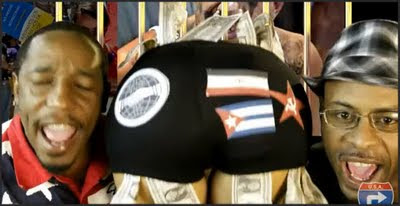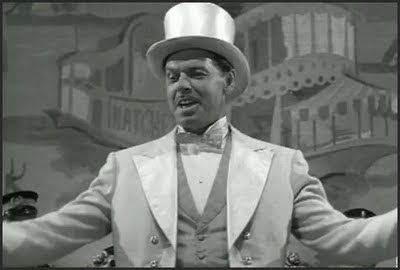You have to look at the American minstrel heritage to get a better understanding. This is a look at the structure of the performances.

It was a free for all until a structured theatrical format was created. Many of the sources that I read cite E.P. Christy's The Christy Minstrels as the first group that developed the framework of the performances.
One of the performers, G.W. Moore, wrote a book about his theatrical experiences, knowledge of the Ethiopian people and some of the routines of the day. The book is called Bones: his anecdotes and goaks [by] G.W. Moore, the original Christy Minstrel. I accessed the book at the Hathi Trust Digital Library. The book is in the public domain.
I'll let Mr. Moore help you get acclimated with the language of the performance and his opinion on the linguistical skills of the black population:
The black population of the United States, are quiteImagine that you are in a dark theater. The curtain goes up and you are transported to the 1800s.
different from the white, in the way they pronounce the
English language, and also in their actions. I have seldom
heard a negro say yes or no direct; for instance, if you ask a
darkey to have a glass of brandy, (and he wanted it) he
would say, " Pass it 'long," "Han em ober," or "Tote dat
dis wa," but not " yes." Again, should he not want the
brandy, he would say, "Ho's yu torkin tu ? dun did kum
fulin yor time roun dis chile wid dat stuff," bwdt seldom "no."
Processional Entrance
The performers enter and present themselves to the audience, usually by music and dance. They are arraigned in a semi-circle facing the audience. Mr. Moore elucidates:
As far as I have been able to judge, I think that all the Ethiopian race are full of music. I knew a darkey who was Boots at the
Eagle Hotel, Buffalo, every time he used to sit down to his
meals, and before eating, he would sing—
Dar's music in de frien pan,
Dar's music in de kittel,
Dar's music in de nife an fork,
Wen I'm gwine to ete de wittel.
Brandi wil be brandi,
Anihow yu mix it;
Nigger wil be nigger,
Anihow yu fix it.
Basically you have white men in costume, black face make-up and wigs that are controlled by Mr. Interlocutor.

Mr. Interlocutor:
The Interlocutor was the medium/interpreter that communicated with the performers. Most of the time the interlocutor was also in black face make-up but not always. In this segment of the show the Interlocutor would set up the jokes of the day, songs and jabs. There would be two men, Mr. Tambo on the left and Mr. Bones on the right would respond to the questions using stereotyped expressions to float the joke.
From our text of the day comes an example of a routine that Mr. Tambo and Mr. Bones might share with the audience:
A HEAVY BLOW.
Sam. Sa, Bones, did yu here de news ? "We had de gratest blo doun our wa.
Bones. "Wat a kurry kane ?
S. Yes, wun ob dem kurricanes kum doun, and jus blow eberyting in de vilage hi, lo, Jack, an de game, it blow ebery house up, didn't lebe wun, blow ebery house up but
mine.
B. But yors ! how wus it yure house wusnt blone up ?
S. We had a heaby morgage on it, dat kep it doun.
B. Oh, we had wun ob dem in our vilage.
S. Wat, a blo ?
B. No, we had a firei
S. Afire?
B. Yes, red hot; jus kum in de vilage in de nite, an burn ebery house doun; den it kum in mi house, went up in de sellar, doun in de garret, all ober de furnitur, an neber
spilt a ting.
S. (astonished) Neber spilt a ting ?
B. No, we sabe eberyting in de house but de pianner.
S. Whi coodn't yu sabe de pianner.
B. Bekase de engines coodn't pla on de pianner.
Olio or Specialty Acts
Next, the Interlocutor introduced specialty acts that had longer skits, dance numbers or songs or a combination. This is and example by Cotton and Chick Watts:
The specialty act could be a parody of a play, an extended dance number or what ever the talent could provide on that particular night. Often included in the specialty act was a "stump" speech by a political character who mangled proper English.
The Afterpiece:
This could be a riff on a opera, the musical joy and rapture of being on a southern plantation or an extended walk-around.
According to Mr. Moore, Blacks are a fearful sort of being. I don't want to invoke his wrath at being quoted out of context so I'm going to make sure he has his final say:
I think I have explained enough about the blacks, that
you can appreciate the stories and eccentricities I shall
introduce; and I wish it to be distinctly understood,
that, in all things I may bring forward, no offence is meant
towards those who may happen to be of a different colour to
myself; as I have travelled in many parts of the globe, I beg
most respectfully to state, that I never look upon a man from
what place he comes from, but from the place he is worthy
of, believing He who made the white, also made the black,
and that they will stand the same chance as myself in the
world to come; therefore, all that I introduce will be for
your amusement, and trust the same will meet with your
approbation.
Social Media 1800s Style
I have been using the theater a visual example but minstrel performances were not restricted to just indoors. They certainly would have been included in advertising, medicine shows, traveling independent performers, bars and other public performance spaces.
Sheet music would have been the mp3 player of the day. To be historically accurate there were some black folks selling songs and jokes on the down low to white performers. There were some who snuck on the stage violating state law against blacks and white mixing.
Minstrel shows were entertainment productions with a long lasting cultural impact. The stereotypes, ignorance and prejudice transferred from theater, film, radio, television and current new media.
Next up: My Understanding 21st Century Political Minstrel Videos
Minstrel 101 Resources
Bones: his anecdotes and goaks [by] G.W. Moore, the original Christy minstrel published 1870 located at the HathiTrust Digital Library.
American Minstrel Show Collection with brief history of structure of minstrel shows by Princeton University Library Rare and Special Collections Department.
Lift Every Voice - Music In American Life Albert H. Small Special Collections Library at the University of Virginia.
No comments:
Post a Comment